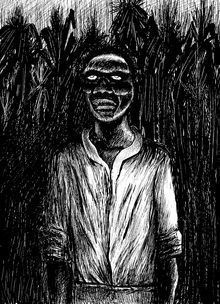Jesus said to her, “I am the resurrection and the life. Those who believe in me, even though they die, will live, and everyone who lives and believes in me will never die. Do you believe this?” (John 11:25-26)
Zombies have been big lately. I never watched the AMC series The Walking Dead, but I understand it was a big hit. My own experience with the zombie apocalypse genre was as a little kid watching an old Vincent Price[i] flick on TV called Last Man on Earth. It scared the crap out of me, and I’ve had quite enough of zombies ever since.
I think of zombies—the living dead—when I read the first Lesson assigned in the RCL for Lent 5, Year A (Ezekiel 37:1-14). This is the Ezekiel’s famous vision of the Valley of Dry Bones. Ezekiel the prophet is a captive exile after Judah’s humiliating defeat at the hands of the Babylonians. Things are looking pretty grim for the “whole house of Israel[ii]” and one could understand if they were feeling a little depressed. I mean, wouldn’t you? The kingdom had lost a war, their holy temple was looted and destroyed, and many of them were carted off to live as slaves in a foreign land where nobody spoke Hebrew and you couldn’t find a good kosher deli anywhere. You can imagine this pretty much sucked the wind out of them.
So God gives their prophet a vision. God shows Ezekiel a valley with the decayed bones of Israel’s dead soldiers, and God tells the prophet to speak a word of hope to these dead. Ezekiel starts prophesying and—sure enough!—the bones come back together, the skin grows over the bones, and before you know it the whole army stands upright again. But, according to verse 8, this host was a host of zombies. They had no breath in them. As you may know, in Hebrew, the word for “breath” or “wind” is also the word for spirit. This defeated host was without spirit, so God tells Ezekiel to speak spirit into them so they will be truly alive.
I wonder if God wasn’t using zombies as a metaphor for the exile community. Yeah, sure, they were alive, but they were without spirit. That is to say, they were without hope.
What does it mean to be truly alive, do you think?
The story of the Raising of Lazarus (John 11:1-45) is a crucial, climactic moment in John’s gospel where we really get to experience a living Jesus. If you read straight through the Fourth Gospel, you’ll realize this is the turning point where events start to race downhill toward Jesus’ crucifixion. This is where we might start to see the Son of God look more like us. In this story we see Jesus crying, feeling both love and grief. From here on we’ll see him feeling apprehensive about his fate. We’ll hear him pray for his disciples. He’ll even humble himself to be their servant and wash their feet. He’ll tell them to love each other as he has loved them. We’ll even see him, as he suffers on the cross, make arrangements for the care of his ageing mother. Now we see Jesus’ true humanity.
I think John wants to give us this picture of a genuine and relatable Messiah so that we may believe in him. When we meet someone and we share in their vulnerability, don’t we have a new relationship with them? Don’t they become more genuine? Don’t we believe in them more? To “believe” in John’s gospel doesn’t mean simply to assent that something may be true. The word in Greek is pisteuo (pisteuw). It means to put trust and confidence in something. When Martha says in verse 27, “Yes, Lord, I believe,” the Greek form of that word means “I really, really believe![iii]” Without belief we have no spirit. If we have no spirit, we’re not really living. We’re just existing. We might as well be zombies.
The gospel calls us to believe in the things of Christ—love, compassion, prayer, humble service, and care for others. We’re called, like Ezekiel, to prophecy to the breath, to speak to the spirit, and to proclaim hope and new life.
After we’ve seen what COVID has done to religious communities I certainly wouldn’t blame anyone for thinking that the Church’s best days are behind her. But belief in Christ means God can bring new life out of death. No matter where we are on life’s highway, it ain’t over ‘til it’s over. There is always a word of faith to proclaim, a deed of love to be done, a blessing to hope for.
The late Pope Benedict XVI wrote,
“Life in its true sense is not something we have exclusively in or from ourselves: it is a relationship. And life in its totality is a relationship with Him who is the source of life. If we are in relation with Him who does not die, who is Life itself and Love itself, then we are in life. Then we ‘live.’[iv]”
Besides: nobody wants to be a zombie.
Thank you again for stopping by my blog this week. Keep the faith!
[i]
BTW: Many years ago I had the honor of meeting the late Mr. Price. For all his creepy
film roles, I found him to be an exceptionally gracious, witty, and very
charming individual. This has nothing to do with John’s gospel, of course. I
just felt like doing a little name dropping.
[ii] As
the folks are called in verse 11.
[iii]
In John’s gospel it’s Martha, not Peter, who makes the first “Good Confession”
that Jesus is the Messiah. Just a reminder that John knew the importance of
women in Jesus’ ministry.
[iv] From
Saved in Hope. (Papal Encyclical,
2007)

No comments:
Post a Comment